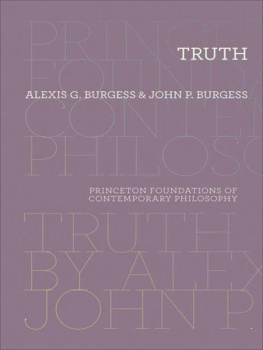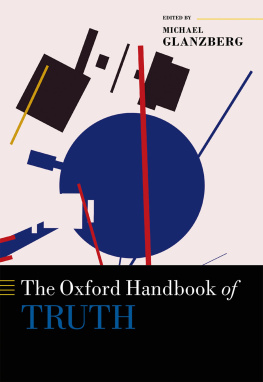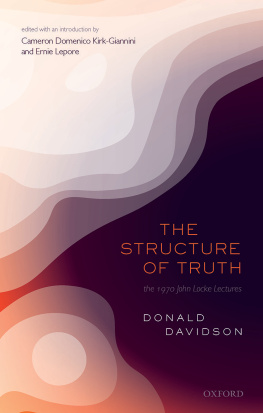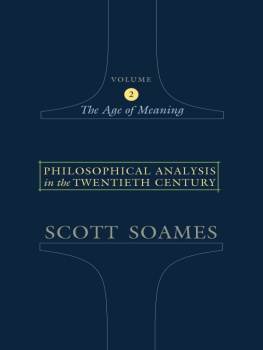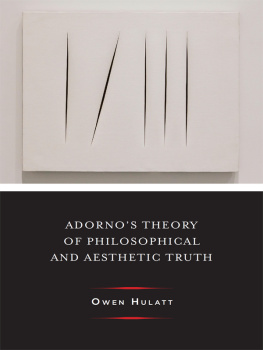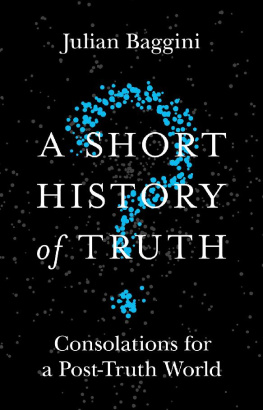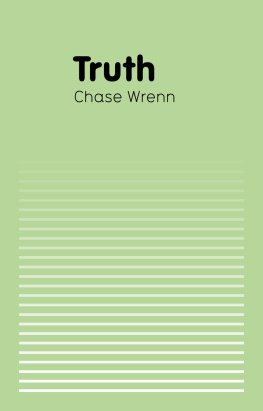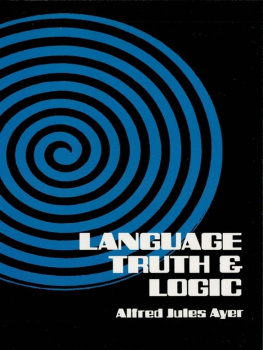PRINCETON FOUNDATIONS OF CONTEMPORARY PHILOSOPHY
Scott Soames, Series Editor
Philosophical Logic by JOHN P. BURGESS
Philosophy of Language by SCOTT SOAMES
Philosophy of Law by ANDREI MARMOR
TRUTH
Alexis G. Burgess & John P. Burgess
PRINCETON UNIVERSITY PRESS
PRINCETON AND OXFORD
Copyright 2011 by Princeton University Press
Published by Princeton University Press, 41 William Street, Princeton, New Jersey 08540 In the United Kingdom: Princeton University Press, 6 Oxford Street, Woodstock, Oxfordshire OX20 1TW press.princeton.edu
All Rights Reserved
Library of Congress Cataloging-in-Publication Data
Burgess, Alexis, 1980-
Truth / Alexis G. Burgess and John P. Burgess.
p. cm. (Princeton foundations of contemporary philosophy)
Includes bibliographical references and index.
ISBN 978-0-691-14401-6 (hardcover : alk. paper) 1. Truth. I. Burgess, John P., 1948- II. Title.
BD171.B85 2010
121dc22
2010041439
British Library Cataloging-in-Publication Data is available
This book has been composed in Archer and Minion Pro
Printed on acid-free paper.
Printed in the United States of America
10 9 8 7 6 5 4 3 2 1
To Anna and Aigli
Contents
Preface
THIS VOLUME IS, in accordance with the aims of the series in which it appears, a somewhat opinionated introductory survey of its subject, at a level suitable for advanced undergraduate or beginning graduate students of philosophy, or the general reader with some philosophical background. The subject is truth, and more specifically, what it is for something to be true, with special emphasis on the question whether there is anything interesting all truths have in common, besides their all being true.
We set aside the postmodernist answer, All truths are enforced by the hegemonic structures of society, on the grounds that it confuses something's passing for true in a given society with its actually being true, overlooking the question, What is something that passes for true in a given society passing for? Questions about what passes for true but isn't, and how it is able to do so, are needless to say of great importance, but writers addressing them have not been lacking.
We also leave to others the question of the value of truth, at least insofar as it is a question of intrinsic value, not just practical utility. The important issues that have been extensively discussed under this heading seem to us really about the intrinsic value, not so much of truth itself, as of something else related to it: of discovering the truth, or of speaking the truth. That one should value knowledge and honesty, rather than contenting oneself with what Harry Frankfurt calls bullshit , we take for granted without comment, and we take for granted that the reader takes it for granted, too.
The issues about truth that remain, the ones we do address, have in recent years been made the subject of dozens of monographs and anthologies, as well as scores of journal articles not yet anthologized. Any survey of this large volume of material will inevitably give more attention to some parts of it than others, with more than a few subtopics getting merely a passing mention (plus references to further literature for the interested reader). Though other authors would doubtless make different judgments about what to emphasize and what not, we do not consider our judgment to be at all eccentric. We do give especially detailed attention to the pros and cons of so-called deflationism, and its claim that there is nothing interesting all truths have in common; but then it is hard to think of an issue that has been more intensively debated in the recent specialist literature on truth.
Though not eccentric, our emphases are not entirely conventional, either. Though for expository purposes we first treat the question of the nature of truth in isolation from consideration of such paradoxical utterances as What I am now saying is false, our real opinion is that the two topics are inseparable. One can go a long way toward the goal of an adequate theory of truth while ignoring the bearing of the paradoxes, but not all the way, and so we have devoted our last two chapters to the paradoxes and attempted solutions. The least conventional aspect of our choice of topics is perhaps our giving attention to a position often treated as unmentionable, the defeatist view that the paradoxes admit no solution.
The paradoxes nonetheless remain for us a subordinate issue. The literature on them fairly quickly gets involved in technicalities, but our discussion goes only as far as is possible without requiring any deep knowledge of technical notions. Moreover, the more technical parts of the material we do include have been placed in sections starred as optional reading, whose omission should not seriously impede understanding of the remainder of the book.
About the division of labor in producing this volume the following may be said. We have drawn on previous work by both of us, especially AGB's doctoral dissertation on fictionalism about truth and public lectures of JPB on Tarski and Kripke. We began with a literature search, making a list of topics needing coverage, with AGB and JPB taking responsibility for the more philosophical and the more technical material, respectively. AGB then undertook extensive drafting, and JPB intensive rewriting to condense to fit the publisher's word limits. As a result of this way of working, JPB is mainly to be blamed for any faults in the condensed style, though AGB did undertake a final editing. In matters of substance rather than style, we stand together.
Acknowledgments
THANKS TO SCOTT SOAMES, for organizing the present series and inviting us to contribute to it. Thanks as well to the staff at Princeton University Press, especially Ian Malcolm, Heath Renfroe, and Leslie Grundfest; to our copyeditor, Jodi Beder; and to the two readers who provided comments on the manuscript.
CHAPTER ONE
Introduction
INQUIRY, IT IS SAID, aims at the truth. Yet it's doubtful there is any such thing as the truth. So it might be better to say that inquiry aims at truths, and better still to say that different inquiries from archeology to zoology aim at different truths from archeological to zoological. Such inquiries have had many successes, but in many cases inquiries are still underway, and success has not yet been achieved. Thus some truths are known, others unknown. But what, if anything, do the different truths, known and unknown, about different topics have in common, to make them all truths? If we knew the answer to this question we'd at least have a better understanding of the nature of inquiry, and perhaps even a better chance of finding what we're looking for when we inquire. But with so many kinds of truths, the project of coming up with a unified conception of what truths are might seem hopeless. Perhaps that is why other inquiries leave it to philosophy.
This little book is about recent philosophical inquiries into what it is for a thing to be true. There are other philosophical questions about truthIs truth of value in itself or only as a means to other ends? How much sense can be made of the idea of one untruth's being closer to truth than another?but there are so many such questions that it would take a book longer than this even just to introduce them all. The question on which we focusWhat is it for a thing to be true?has a certain priority simply because some sort of answer to it has to be presupposed by any serious attempt to answer almost any of the others.
1.1 TRADITIONAL THEORIES
If the best-known saying about truth is Pilate's question, What is truth? (John 18:38), probably the best-known saying about truth by a philosopher is Aristotle's assertion (Metaphysics , 1011b25):
(1) To say of what is that it is not, or of what is not that it is, is false, while to say of what is that it is, and of what is not that it is not, is true.
Next page
